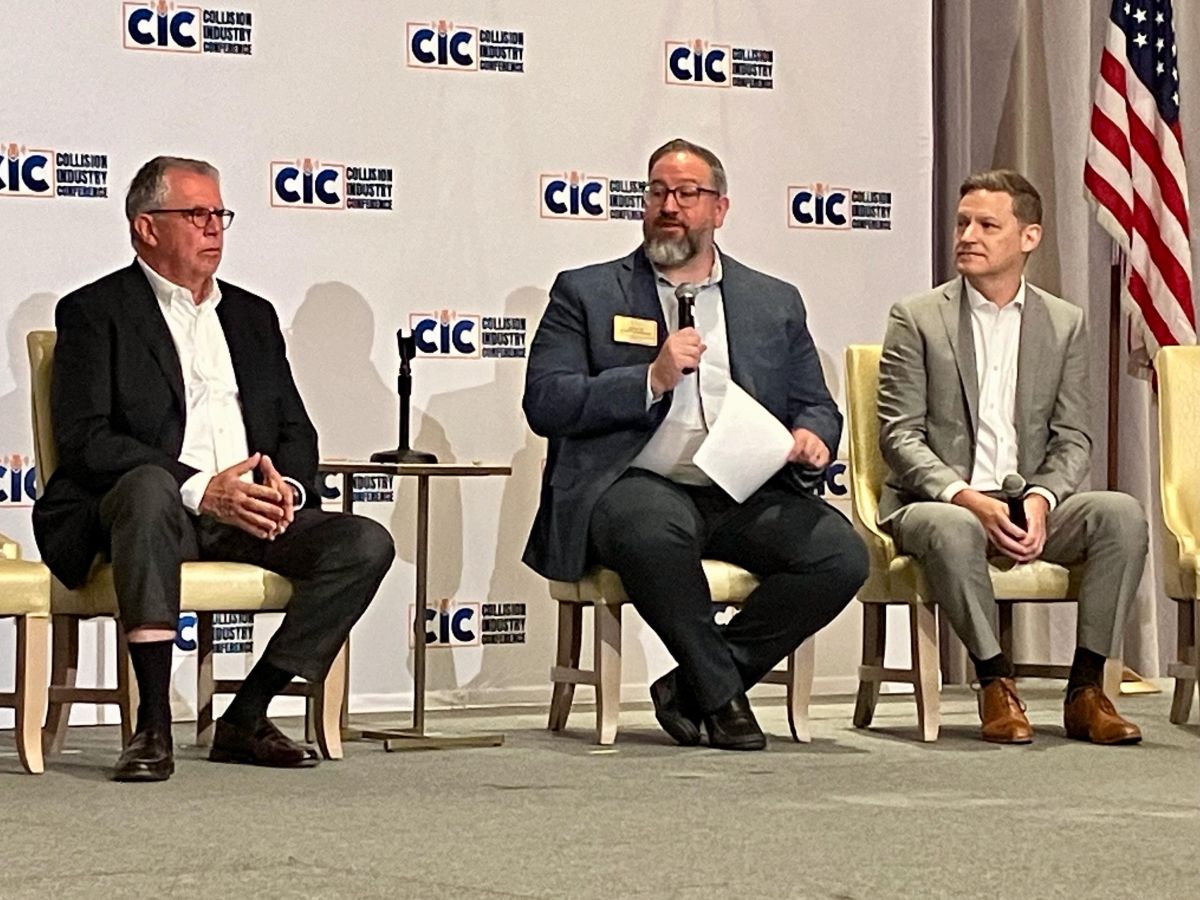Representatives of three trade organizations representing repairers and automakers at the Collision Industry Conference (CIC) in July shared why they’re not supporting federal right to repair legislation under consideration by Congress, and suggested they might seek to introduce an alternative version.
The Right to Equitable and Professional Auto Industry Repair (REPAIR) Act (HR 906) is described by proponents as “right to repair” legislation, in that it would prohibit vehicle manufacturers from impeding a vehicle owner’s access to their vehicle’s data related to diagnostics and repair. But it also would also prohibit automakers from impairing a non-OEM parts manufacturer from producing or selling compatible aftermarket parts.
Speaking during a Governmental Committee presentation at CIC, Aaron Schulenburg, executive director of the Society of Collision Repair Specialists (SCRS), said he thinks it’s the parts aspect that is the real focus of the backers of the legislation, which he called “very difficult to support from the lens of an independent repairer.”
The REPAIR Act is being promoted not by the largest mechanical and collision repair shop trade associations but by the Consumer Access to Repair (CAR) Coalition, which consists of insurance companies, CAPA, LKQ Corporation and other manufacturers and distributors of non-OEM parts.
“What you have is a lot of groups who don’t necessarily represent collision repair businesses, saying they are speaking for collision repair businesses, representing a viewpoint that doesn’t match what [our members] are experiencing in their business,” Schulenburg said.
SCRS and the Automotive Service Association (ASA) have made voluntary agreements with the Alliance for Automotive Innovation, which represents automakers, that they say ensures independent shops have access to the same OEM tools and information that automakers make available to their dealerships.
ASA lobbyist Bob Redding said the three groups are working to educate members of Congress about the voluntary agreement and show them it’s working.
Wayne Weikel of the Alliance for Automotive Innovation said it’s challenging to distinguish being supportive of the “right to repair” and of making information available to independent shops -- but not the REPAIR Act itself.
“Automakers should have our own bill instead of trying to just play defense and trying to fix something that's probably unfixable,” Weikel said. “We should have our own federal bill that supports safe repairs. Collision repairs shouldn’t have to fight to make sure they can do proper repairs.”
Redding said the August Congressional break and this fall’s election means the window for the REPAIR Act to move forward is rapidly closing.
“Moving anything controversial, where not everybody’s on the same team in a very divided Congress, is going to be hard,” Redding said. “If it doesn’t go all the way to the president’s desk soon, it will have to be reintroduced in the next Congress in 2025.”
It was clear at the meeting that many in the industry aren’t well-informed about the legislation. Prior to the committee’s presentation, a poll found nearly half of CIC attendees (48%) acknowledged they didn’t “understand the REPAIR Act enough to have an informed opinion about it.”
That appeared to have changed following the committee’s presentation.
“The social media ads that I’m seeing regularly, ‘It’s your car, your right, contact Congress now,’ that’s not you guys, that’s not our industry? You’re kidding me,” Washington state shop owner Jeff Butler said following the committee’s presentation. “So this social media campaign that says ‘support your local auto shop’ is not our industry supporting local auto shops.”
Weikel said he understands the confusion about the legislation.
“We spend a lot of time on [Capitol] Hill going in and explaining [to members of Congress], ‘I understand this has been presented as the right to repair, but they don’t actually represent repairers,’” Weikel said. “’Here’s what actual repairers say, and here’s what automakers provide [to the independent repair industry]. And yes, that’s completely counter to what you have been told on the REPAIR Act.’
“So this is why we’ve spent so much time working together [with ASA and SCRS] because the REPAIR Act has been framed very well,” Weikel continued. “People who do my job for the other side on this issue do it very well, presenting this as being about the ability to complete a repair, but when you actually read the bill, that’s not what’s in the bill.”
“They don't understand all the dynamics of the various industry sectors,” Redding agreed about members of Congress.
Schulenburg said he’s not hearing from shops being unable to access automaker procedures, only from shops getting pushback from insurers related to following and being paid for those procedures. It’s those dynamics that Schulenburg think should be addressed in any “right to repair” legislation.
“I think if there’s going to be a focus on access to [automaker] information, there should be an equal focus on utilization of the information,” Schulenburg said. “I think there's a lot of focus right now on safer roadways, safer vehicles. There’s a lot of push by people in both the insurance industry and the regulatory worlds to add technology to vehicles to make them safer. And then the same people who push for that often create obstacles in the claims settlement.
“So if we think safer roadways are important, if we think safer vehicles are important, then safer repairs should also be prioritized in that as well, and not be left out as part of the equation,” Schulenburg said. “So I think for us, for our organization, that’s certainly something that’s a priority.”















John Yoswick